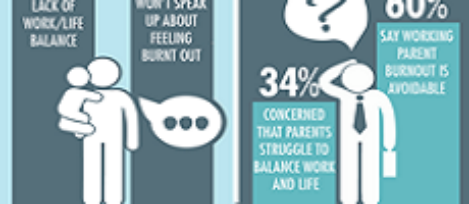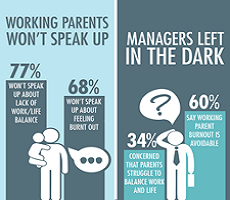January 25, 2016
Families struggle for work life balance despite changing gender roles 0
 A new report published today by the charity Working Families and nursery provider Bright Horizons suggests that parents are at greater risk of burn out as they strive for work life balance, with fathers at increasing risk as a result of their changing roles and expectations. The Modern Families Index is an annual study that explores how working families manage their work-life balance. This year’s report claims that nearly half (42 percent) of Generation Y fathers (born after 1980) feel burnt out most or all of the time, compared to just 22 percent of Gen Xers aged 36 to 45 and 17 percent of baby boomers aged over 45. The report claims that a growing number of fathers are now facing the same challenges and life choices most commonly ascribed to mothers. The study found that in half (49 percent) of the 1,000 couples surveyed, both parents were working full time. The figure rose to 78 percent for those in their twenties or thirties.
A new report published today by the charity Working Families and nursery provider Bright Horizons suggests that parents are at greater risk of burn out as they strive for work life balance, with fathers at increasing risk as a result of their changing roles and expectations. The Modern Families Index is an annual study that explores how working families manage their work-life balance. This year’s report claims that nearly half (42 percent) of Generation Y fathers (born after 1980) feel burnt out most or all of the time, compared to just 22 percent of Gen Xers aged 36 to 45 and 17 percent of baby boomers aged over 45. The report claims that a growing number of fathers are now facing the same challenges and life choices most commonly ascribed to mothers. The study found that in half (49 percent) of the 1,000 couples surveyed, both parents were working full time. The figure rose to 78 percent for those in their twenties or thirties.









 The Government is being urged to reassess its plans to request an opt-out from the EU Working Time Directive, when it seeks to renegotiate the terms of the UK’s membership of the EU. The Directive stipulates a 48 hour working week, which the Government has argued is stifling competitiveness and flexibility. According to research by
The Government is being urged to reassess its plans to request an opt-out from the EU Working Time Directive, when it seeks to renegotiate the terms of the UK’s membership of the EU. The Directive stipulates a 48 hour working week, which the Government has argued is stifling competitiveness and flexibility. According to research by 













